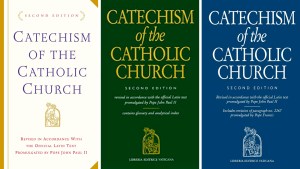When discussing various teachings of the faith, the word “catechism” will often be brought up.
What does the word “catechism” mean?
According to the Catholic Encyclopedia, the word “catechism” stems from a Greek word that is found in the Gospels.
The wordkatechesis means instruction by word of mouth, especially by questioning and answering. Though it may apply to any subject-matter, it is commonly used for instruction in the elements of religion, especially preparation for initiation into Christianity. The word and others of the same origin occur in St. Luke’s Gospel: “That thou mayest know the verity of those things in which thou hast been instructed” (katechethes, in quibus eruditus es — i, 4). In Acts 18:25, Apollo is described as “instructed [katechemenos, edoctus] in the way of the Lord”.
A catechism is simply a printed version of this concept, featuring questions and answers on all aspects of the Catholic faith.
The Catholic Church has has many different catechisms in her history, the most well-known being the Roman Catechism, from the Council of Trent, and the Catechism of the Catholic Church, stemming from the Second Vatican Council.
Besides these “universal” catechisms, local bishops have produced their own catechisms, such as the Baltimore Catechism in the United States.
Catechisms remain a vital part of the Church’s life, as they contain a synopsis of what the Catholic Church teaches, making the faith intelligible for people in their contemporary context.



